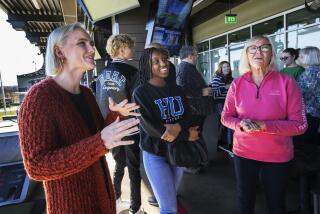Son of the Cold War won’t let era be buried : Francis Gary Powers Jr. wants a museum devoted to the struggle that engulfed his father.
- Share via
LANGLEY, Va. — For the son of Francis Gary Powers, who piloted the infamous U2 spy flight that worsened already tense U.S. relations with the Soviet Union in 1960, making sure his father isn’t forgotten is part of a family tradition. After all, his grandfather tried to do his part in the efforts to free the pilot from Soviet captivity.
Now, the pilot’s son, who bears his father’s name as well as his likeness, is attempting another type of rescue mission--to preserve his father’s place in history by establishing a Cold War Museum.
Francis Gary Powers Jr. has created an exhibit of personal mementos and spy memorabilia commemorating his father’s life called “Return to ‘Glorie’ Land.” The exhibit is at CIA headquarters here as part of the agency’s commemoration of its 50th anniversary.
Powers, 31, wants the proposed museum to include exhibits on several of the cornerstones of the Cold War, including the Cuban missile crisis, the space race and the rise and fall of the Berlin Wall.
Although the museum is still in its formative stages, Powers is optimistic about its future. He is in the process of forming its board of directors, a group he hopes will include Brown University professor Sergei Khrushchev, the son of Nikita S. Khrushchev, the Soviet leader when the U2 plane crashed.
“In a way, I am honoring my father. But I want the museum to honor all of the men and women who died for American freedom during the Cold War,” Powers said.
Powers’ father was taking pictures of Soviet missile installations from 70,000 feet when he was shot down on May 1, 1960. After his return to the United States in 1962, he worked as a helicopter pilot for KNBC in Los Angeles.
The elder Powers died in 1977 when his helicopter ran out of fuel and crashed in San Diego’s Balboa Park. Francis Powers Jr. grew up in Sherman Oaks and earned his college degree at Cal State L.A.
Today marks the 35th anniversary of testimony by Powers Sr. to a Senate committee concerning his ill-fated flight.
“No one knew the truth,” Powers Jr. said. “Some people thought he had disobeyed orders and should have killed himself rather than be captured. There was even one theory that said he had landed the plane in Russia and was a traitor.”
The capture of Powers, which the Eisenhower administration denied until the Soviet government produced a picture of the pilot, caused the United States international embarrassment and resulted in the cancellation of a U.S.-Soviet summit scheduled just a few weeks before the U2 crash.
Powers Sr. told the Senate panel that Soviet antiaircraft fire exploded close enough to his plane to damage it. He parachuted to Russian territory.
This was his father’s most terrifying moment, Powers Jr. said. He was equipped with a small pin laced with poison concealed inside a hollowed-out silver coin and was tempted to use it, his son said. He decided against suicide, although he kept the pin with him in case the Soviet government decided to torture him for information.
The pin was later discovered by the Soviets, who tested the poison on a dog. The dog died within 30 seconds.
Powers Sr. was found guilty of espionage in August 1960 and sentenced to 10 years in prison. Although he was not physically tortured during his incarceration, he was locked up in Vladimir Prison, a camp for political prisoners.
In 1962, Oliver Powers, a coal miner unsatisfied with the U.S. government’s efforts to free his son, wrote a letter to Rudolf Abel, a Soviet spy being held in the U.S.
Abel received the letter and responded with his wife’s address, which was in fact a front for the Soviet government. At this point, the Kennedy administration ended Oliver Powers’ private crusade to free his son, fearing that it would hinder talks to exchange the U.S. pilot for Abel.
Almost two years after Powers Sr. took off in his U2 from the U.S. air base in Pakistan, the exchange of prisoners took place.
The exhibit devised by Powers’ son takes its unusual name from a note that his father received from another prisoner in Vladimir Prison. The note began: “If you are the man from the glorie land . . . “ and expressed the hope that the pilot would get to return home someday.
Powers Sr. initially thought the message, written in broken and poorly spelled English, was a code of some sort. But he later concluded that it was simply a message of encouragement from a fellow prisoner. He never located the note’s author. “Return to ‘Glorie’ Land” will remain at CIA headquarters until the end of March, when it will travel to the National War College in Washington.
More to Read
Sign up for Essential California
The most important California stories and recommendations in your inbox every morning.
You may occasionally receive promotional content from the Los Angeles Times.













